There are quite expensive obsolete chip from various Commodore computers and peripherals- CIA/PIA MOS 6526 and a bit changed 8520 used in Amiga computers. This is a “complex” peripheral interface adapter chip for 6502 processor or 68K chipset.
It is quite complex, as it has: 16 individual programmed I/O lines, 2 independent, linkable timers, real time clock timer/counter, shift register for serial interface and some other stuff. As this chip is for “interface”, some of the pins go outside the computer and connect to various other devices or… some strange objects like metal pins or pens. S, short circuit, ESD spikes can kill these chips. When I lived in Soviet Union, I blew an Amiga 8520 chip and I had my Amiga shelved for several years!
Now it is still possible to buy these chips- sometimes NOS (very expensive), sometimes good pullouts, but sometimes fake ones. And you have to spend over 25USD for just one chip. Maybe it is good variant to buy a DEAD computer in the hope that the chip may be fine.
I am cleaning, testing and rearranging my old computer collection and I decided to repair some of them because now I have more money and more knowledge. And I have spare CPLD boards from Russian Igrosoft computers. So, one day I decided to build some test rig and build my own CIA/PIA in CPLD (it is 5V TTL compatible).
Here is the CPLD CIA/PIA workplace:
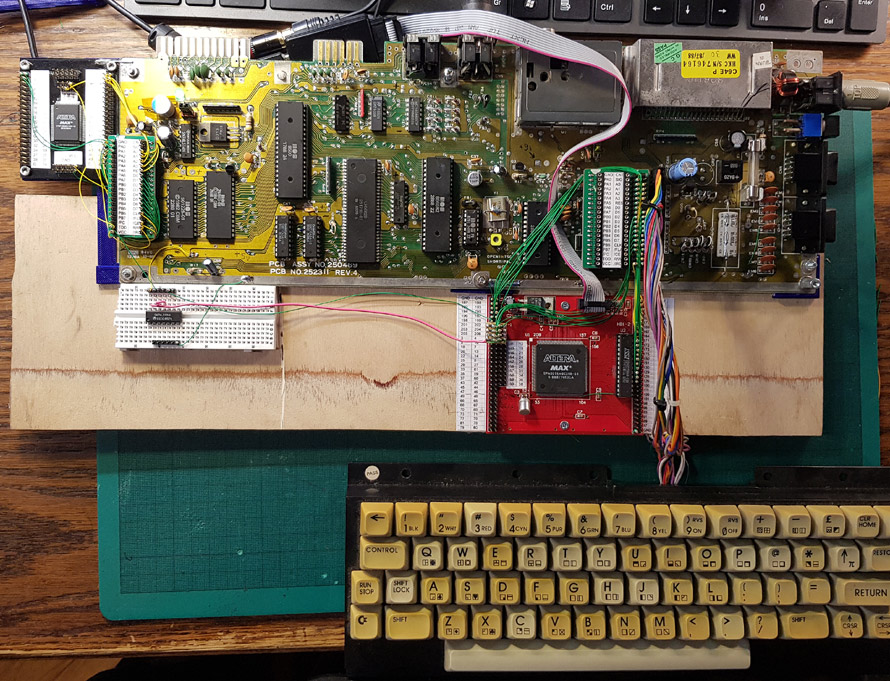
This computer has both 6526 dead. Left CIA is only partially emulated- so I used a smaller CHIP. Meanwhile the right one is more complex. This is not only timers, int, but also keyboard interface.
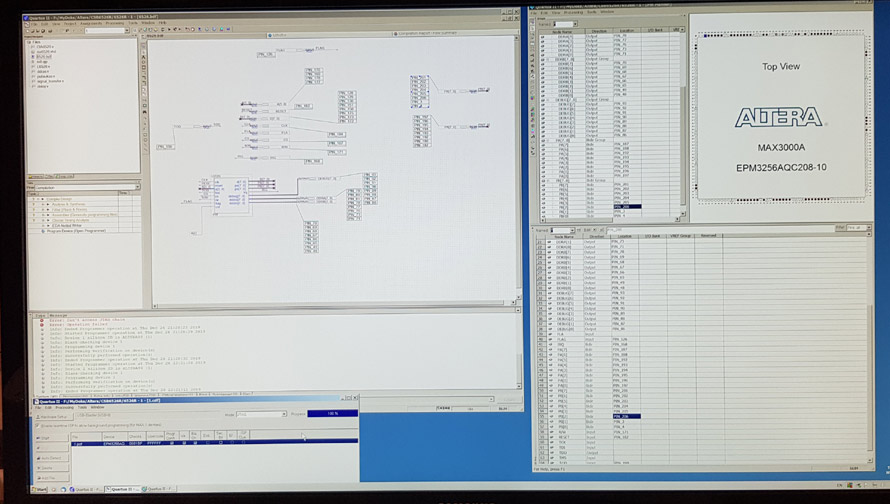
I wrote everything using Altera- Intel Quartus software. It is free for MAX series CPLD. I started a project in the 9th version of software, but encountered strange bugs and also, my hardware description did not fit the chip. Meanwhile, the newer version was fine.
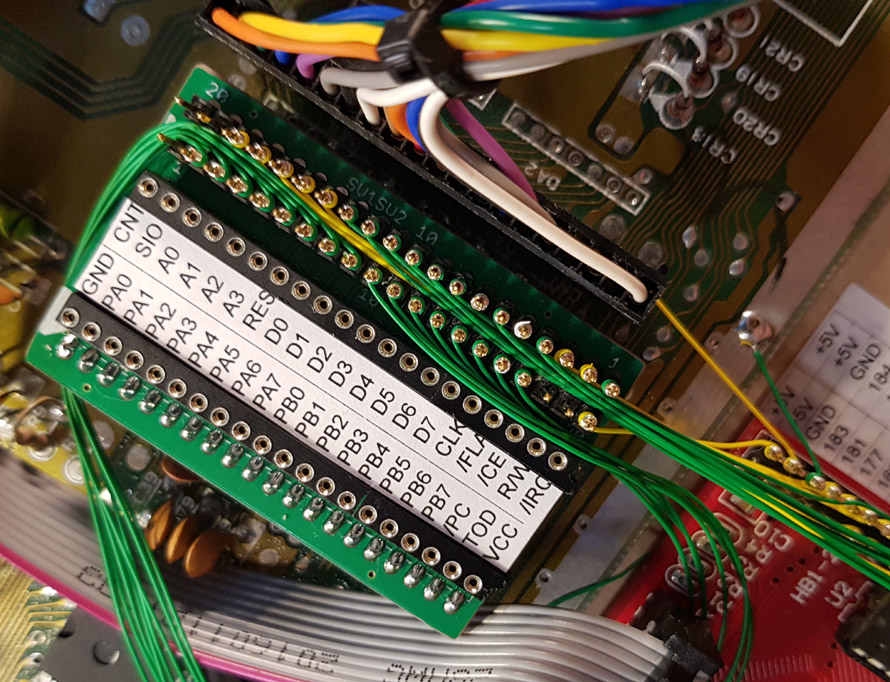
I am using a special self made PCB with precision sockets and pins. All connections to CPLD boards are made using wire wrap technology. I think it is best technology to connect hundreds of wires in not permanent way. I can redo the connection in case I mix something.
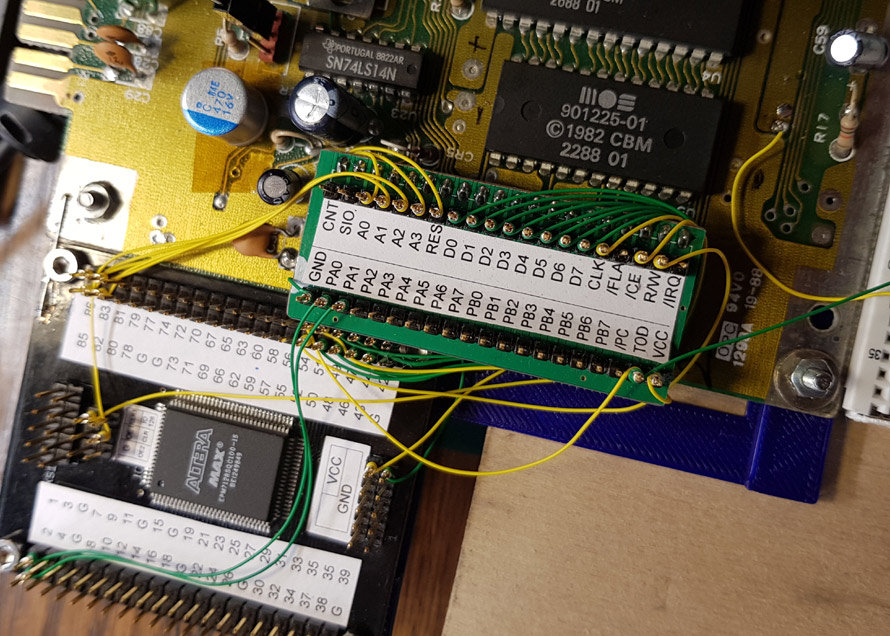
This is a smaller CPLD. Only timer and fontbase selector is “build” inside it.
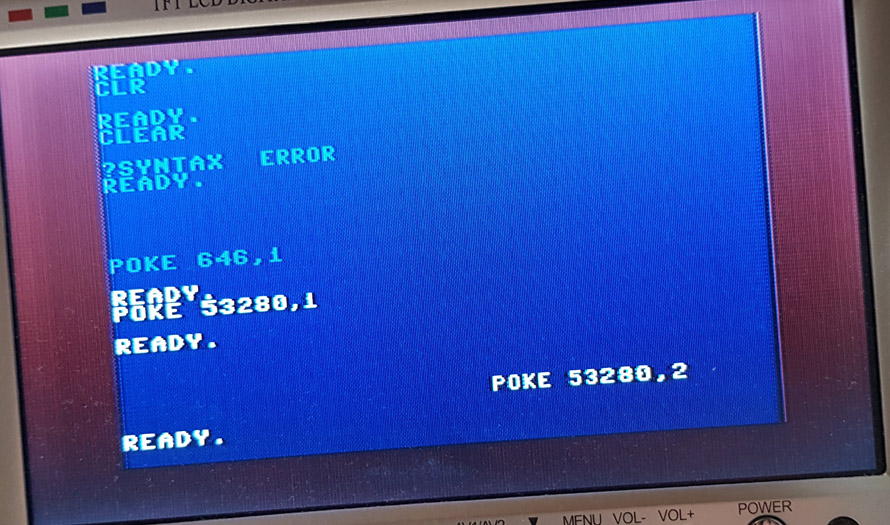
From black screen I have a working keyboard (cursor is OK, just in photo is not visible), timers and interrupts.
But… I found a trash completed PCB of Commodore 128 with a working CIA on board. So I abandoned this project for a while. Maybe in near future, maybe never.
Source code in Verilog hardware description language is available on demand.

Hi there, I’m interested in seeing your source code if you don’t mind sharing?
A zip of the project would be very cool.
🙂
URL for my blog
Hi I’m also interested in seeing your source code if you don’t mind sharing?
Thx
I’ve found only few “starting” versions of the code. I will post it sooner or later when I will be near “that” computer used for CPLD programming.
Hi I’m also interested in seeing your source code if you don’t mind sharing?
Thx
C64 6526. uncomplete.
There seems to be all kinds of unfinished projects on the web but nobody has finished a 8520. Making a CIA chip replacement that would be 100% compatible minus the ESD problems would sell tons.
try this one 🙂
/*
* Implementation of 8520 Complex Interface Adapter (CIA) in Verilog.
* Written by Niklas Ekström in June 2021.
*
* Features:
* – 2x 8-bit I/O ports (PORTA, PORTB)
* – Handshaking for I/O port communication (PC, FLAG)
* – 2x interval timers (TA, TB)
* – Time of Day clock (TOD)
* – Serial port (SDR)
* – Interrupt control (ICR)
* – Control Registers (CRA, CRB)
*
* Features that are deliberately not implemented:
* – Outputting TA/TB underflow on PB6/7 (PBON, OUTMODE bits are stuck zero)
* – Using CNT as source for TA/TB (INMODE bit is stuck zero)
*
* Features that could probably be removed to save logic elements:
* – I don’t think the TOD alarm feature is used.
*
* Gotchas:
* – The polarity of shift_out_clk and the CNT signal are inverted. It seems like
* CNT is active low (and perhaps should have been called CNT_n).
*/
module cia(
// Chip access control.
input RESET_n,
input E_CLK,
input CS_n,
input RW,
input [3:0] A,
inout [7:0] D,
// Port A/B.
inout [7:0] PA,
inout [7:0] PB,
// Handshake.
output PC_n,
input FLAG_n,
// Serial port.
inout CNT,
inout SP,
// TOD tick.
input TICK,
// Interrupt.
output IRQ_n
);
localparam [3:0] REG_PRA = 4’h0;
localparam [3:0] REG_PRB = 4’h1;
localparam [3:0] REG_DDRA = 4’h2;
localparam [3:0] REG_DDRB = 4’h3;
localparam [3:0] REG_TA_LO = 4’h4;
localparam [3:0] REG_TA_HI = 4’h5;
localparam [3:0] REG_TB_LO = 4’h6;
localparam [3:0] REG_TB_HI = 4’h7;
localparam [3:0] REG_TOD_LOW = 4’h8;
localparam [3:0] REG_TOD_MID = 4’h9;
localparam [3:0] REG_TOD_HI = 4’ha;
localparam [3:0] REG_B_UNUSED = 4’hb;
localparam [3:0] REG_SDR = 4’hc;
localparam [3:0] REG_ICR = 4’hd;
localparam [3:0] REG_CRA = 4’he;
localparam [3:0] REG_CRB = 4’hf;
// Control registers.
reg ta_running;
reg ta_oneshot;
reg sp_output;
reg tb_running;
reg tb_oneshot;
reg tb_count_ta_underflow;
reg tod_set_alarm;
wire [7:0] cra = {1’b0, sp_output, 2’b00, ta_oneshot, 2’b00, ta_running};
wire [7:0] crb = {tod_set_alarm, tb_count_ta_underflow, 2’b00, tb_oneshot, 2’b00, tb_running};
// Port A/B.
reg [7:0] ddra;
reg [7:0] pra;
reg [7:0] ddrb;
reg [7:0] prb;
assign PA[0] = ddra[0] ? pra[0] : 1’bz;
assign PA[1] = ddra[1] ? pra[1] : 1’bz;
assign PA[2] = ddra[2] ? pra[2] : 1’bz;
assign PA[3] = ddra[3] ? pra[3] : 1’bz;
assign PA[4] = ddra[4] ? pra[4] : 1’bz;
assign PA[5] = ddra[5] ? pra[5] : 1’bz;
assign PA[6] = ddra[6] ? pra[6] : 1’bz;
assign PA[7] = ddra[7] ? pra[7] : 1’bz;
assign PB[0] = ddrb[0] ? prb[0] : 1’bz;
assign PB[1] = ddrb[1] ? prb[1] : 1’bz;
assign PB[2] = ddrb[2] ? prb[2] : 1’bz;
assign PB[3] = ddrb[3] ? prb[3] : 1’bz;
assign PB[4] = ddrb[4] ? prb[4] : 1’bz;
assign PB[5] = ddrb[5] ? prb[5] : 1’bz;
assign PB[6] = ddrb[6] ? prb[6] : 1’bz;
assign PB[7] = ddrb[7] ? prb[7] : 1’bz;
always @(negedge E_CLK or negedge RESET_n) begin
if (!RESET_n) begin
pra <= 8'd0; prb <= 8'd0; ddra <= 8'd0; ddrb <= 8'd0; end else if (!CS_n && !RW) begin case (A) REG_PRA: pra <= D; REG_PRB: prb <= D; REG_DDRA: ddra <= D; REG_DDRB: ddrb <= D; endcase end end reg pc; assign PC_n = pc ? 1'b0 : 1'bz; always @(negedge E_CLK or negedge RESET_n) begin if (!RESET_n) pc <= 1'b0; else pc <= !CS_n && A == REG_PRB; end reg [1:0] flag_n_sync; always @(negedge E_CLK) flag_n_sync <= {flag_n_sync[0], !FLAG_n}; wire flag_falling = flag_n_sync[1] && !flag_n_sync[0]; // Interval timers. reg [15:0] ta_counter; reg [15:0] tb_counter; reg [15:0] ta_latch; reg [15:0] tb_latch; wire ta_underflowing = ta_running && ta_counter == 16'd0; wire tb_underflowing = tb_running && (!tb_count_ta_underflow || ta_underflowing) && tb_counter == 16'd0; // Update ta_latch, tb_latch. always @(negedge E_CLK or negedge RESET_n) begin if (!RESET_n) begin ta_latch <= 16'd0; tb_latch <= 16'd0; end else if (!CS_n && !RW) begin case (A) REG_TA_LO: ta_latch[7:0] <= D; REG_TA_HI: ta_latch[15:8] <= D; REG_TB_LO: tb_latch[7:0] <= D; REG_TB_HI: tb_latch[15:8] <= D; endcase end end // Update ta_counter. always @(negedge E_CLK or negedge RESET_n) begin if (!RESET_n) ta_counter <= 16'd0; else begin if (!CS_n && !RW && A == REG_CRA && D[4]) ta_counter <= ta_latch; else if (!CS_n && !RW && A == REG_TA_HI && (!ta_running || ta_oneshot)) ta_counter <= {D, ta_latch[7:0]}; else if (ta_running) begin if (ta_counter == 16'd0) ta_counter <= ta_latch; else ta_counter <= ta_counter - 16'd1; end end end // Update tb_counter. always @(negedge E_CLK or negedge RESET_n) begin if (!RESET_n) tb_counter <= 16'd0; else begin if (!CS_n && !RW && A == REG_CRB && D[4]) tb_counter <= tb_latch; else if (!CS_n && !RW && A == REG_TB_HI && (!tb_running || tb_oneshot)) tb_counter <= {D, tb_latch[7:0]}; else if (tb_running && (!tb_count_ta_underflow || ta_underflowing)) begin if (tb_counter == 16'd0) tb_counter <= tb_latch; else tb_counter <= tb_counter - 16'd1; end end end // Update ta_running. always @(negedge E_CLK or negedge RESET_n) begin if (!RESET_n) ta_running <= 1'b0; else begin if (!CS_n && !RW && A == REG_CRA) ta_running <= D[0]; else if (!CS_n && !RW && A == REG_TA_HI && ta_oneshot) ta_running <= 1'b1; else if (ta_underflowing && ta_oneshot) ta_running <= 1'b0; end end // Update tb_running. always @(negedge E_CLK or negedge RESET_n) begin if (!RESET_n) tb_running <= 1'b0; else begin if (!CS_n && !RW && A == REG_CRB) tb_running <= D[0]; else if (!CS_n && !RW && A == REG_TB_HI && tb_oneshot) tb_running <= 1'b1; else if (tb_underflowing && tb_oneshot) tb_running <= 1'b0; end end // Update ta_oneshot, tb_oneshot, tb_count_ta_underflow. always @(negedge E_CLK or negedge RESET_n) begin if (!RESET_n) begin ta_oneshot <= 1'b0; tb_oneshot <= 1'b0; tb_count_ta_underflow <= 1'b0; end else if (!CS_n && !RW) begin if (A == REG_CRA) ta_oneshot <= D[3]; if (A == REG_CRB) begin tb_oneshot <= D[3]; tb_count_ta_underflow <= D[6]; end end end // Time of Day clock (TOD). reg [23:0] tod_counter; reg [23:0] tod_latch; reg [23:0] tod_alarm; reg alarm_set; reg tod_running; reg tod_latched; reg tick_sync_1; reg tick_sync_2; // Update tod_set_alarm. always @(negedge E_CLK or negedge RESET_n) begin if (!RESET_n) tod_set_alarm <= 1'b0; else if (!CS_n && !RW && A == REG_CRB) tod_set_alarm <= D[7]; end // Update tod_latched, tod_latch. always @(negedge E_CLK or negedge RESET_n) begin if (!RESET_n) tod_latched <= 1'b0; else if (!CS_n && RW) begin if (A == REG_TOD_HI) begin tod_latch <= tod_counter; tod_latched <= 1'b1; end else if (A == REG_TOD_LOW) tod_latched <= 1'b0; end end // Update alarm_set. always @(negedge E_CLK or negedge RESET_n) begin if (!RESET_n) alarm_set <= 1'b0; else if (!CS_n && !RW && tod_set_alarm && A == REG_TOD_LOW) alarm_set <= 1'b1; end // Update tod_alarm. always @(negedge E_CLK or negedge RESET_n) begin if (!RESET_n) tod_alarm <= 24'd0; else if (!CS_n && !RW && tod_set_alarm) begin case (A) REG_TOD_LOW: tod_alarm[7:0] <= D; REG_TOD_MID: tod_alarm[15:8] <= D; REG_TOD_HI: tod_alarm[23:16] <= D; endcase end end always @(negedge E_CLK) begin tick_sync_1 <= TICK; tick_sync_2 <= tick_sync_1; end wire tod_write = !CS_n && !RW && !tod_set_alarm && (A == REG_TOD_HI || A == REG_TOD_MID || A == REG_TOD_LOW); always @(negedge E_CLK or negedge RESET_n) begin if (!RESET_n) begin tod_running <= 1'b0; tod_counter <= 24'd0; end else if (tod_write) begin case (A) REG_TOD_HI: tod_counter[23:16] <= D; REG_TOD_MID: tod_counter[15:8] <= D; REG_TOD_LOW: tod_counter[7:0] <= D; endcase tod_running <= A == REG_TOD_LOW; end else if (tod_running && !tick_sync_2 && tick_sync_1) tod_counter <= tod_counter + 24'd1; end wire alarm_equal = tod_counter == tod_alarm; reg prev_alarm_equal; always @(negedge E_CLK) prev_alarm_equal <= alarm_equal; wire alarm_fired = tod_running && alarm_set && !prev_alarm_equal && alarm_equal; // Serial port. reg [7:0] sdr_in; reg [7:0] shift_in; reg [2:0] shift_in_counter; wire sp_in_reset_n = RESET_n && !sp_output; always @(posedge CNT or negedge sp_in_reset_n) begin if (!sp_in_reset_n) begin sdr_in <= 8'd0; shift_in <= 8'd0; shift_in_counter <= 3'd0; end else begin shift_in <= {shift_in[6:0], SP}; if (shift_in_counter == 3'd7) sdr_in <= {shift_in[6:0], SP}; shift_in_counter <= shift_in_counter + 3'd1; end end // Clock domain crossing for shift_in_complete. reg shift_in_complete_req; reg shift_in_complete_ack; always @(posedge CNT or negedge RESET_n) begin if (!RESET_n) shift_in_complete_req <= 1'b0; else if (!sp_output && shift_in_counter == 3'd7) shift_in_complete_req <= !shift_in_complete_ack; end reg shift_in_complete; always @(posedge E_CLK or negedge RESET_n) begin if (!RESET_n) shift_in_complete <= 1'b0; else shift_in_complete <= shift_in_complete_req != shift_in_complete_ack; end always @(negedge E_CLK or negedge RESET_n) begin if (!RESET_n) shift_in_complete_ack <= 1'b0; else if (shift_in_complete) shift_in_complete_ack <= shift_in_complete_req; end // Update sp_output. always @(negedge E_CLK or negedge RESET_n) begin if (!RESET_n) sp_output <= 1'b0; else if (!CS_n && !RW && A == REG_CRA) sp_output <= D[6]; end reg [7:0] sdr_out; reg sdr_out_new_data; reg shift_out_running; reg [7:0] shift_out; reg [2:0] shift_out_counter; reg shift_out_clk; wire shift_out_complete = shift_out_running && shift_out_counter == 3'd7 && shift_out_clk && ta_underflowing; wire shift_complete = shift_in_complete | shift_out_complete; always @(negedge E_CLK or negedge RESET_n) begin if (!RESET_n) sdr_out <= 8'd0; else if (!CS_n && !RW && A == REG_SDR) sdr_out <= D; end always @(negedge E_CLK or negedge RESET_n) begin if (!RESET_n) begin shift_out <= 8'd0; shift_out_clk <= 1'b0; shift_out_counter <= 3'd0; end else if (sp_output) begin if (!CS_n && !RW && A == REG_CRA && !D[6]) begin // FIXME: Should this be combined with reset handling? shift_out <= 8'd0; shift_out_clk <= 1'b0; shift_out_counter <= 3'd0; end else begin if (shift_out_running && ta_underflowing) begin if (!shift_out_clk) begin if (shift_out_counter == 3'd0) shift_out <= sdr_out; else shift_out <= {shift_out[6:0], 1'b0}; end else shift_out_counter <= shift_out_counter + 3'd1; shift_out_clk <= !shift_out_clk; end end end end // Update shift_out_running, sdr_out_new_data. always @(negedge E_CLK or negedge RESET_n) begin if (!RESET_n) begin shift_out_running <= 1'b0; sdr_out_new_data <= 1'b0; end else if (sp_output) begin if (!CS_n && !RW && A == REG_CRA && !D[6]) begin // FIXME: Should this be combined with reset handling? shift_out_running <= 1'b0; sdr_out_new_data <= 1'b0; end else if (!CS_n && !RW && A == REG_SDR) begin if (!shift_out_running || shift_out_complete) shift_out_running <= 1'b1; else sdr_out_new_data <= 1'b1; end else if (shift_out_complete) begin if (!sdr_out_new_data) shift_out_running <= 1'b0; else sdr_out_new_data <= 1'b0; end end end assign SP = sp_output && !shift_out[7] ? 1'b0 : 1'bz; assign CNT = sp_output && shift_out_clk ? 1'b0 : 1'bz; // Interrupt handling. reg [4:0] icr_mask; reg [4:0] icr_data; wire ir = |(icr_data & icr_mask); assign IRQ_n = ir ? 1'b0 : 1'bz; // Update icr_mask. always @(negedge E_CLK or negedge RESET_n) begin if (!RESET_n) icr_mask <= 5'd0; else if (!CS_n && !RW && A == REG_ICR) begin if (D[7]) icr_mask <= icr_mask | D[4:0]; else icr_mask <= icr_mask & ~D[4:0]; end end wire [4:0] icr_set = {flag_falling, shift_complete, alarm_fired, tb_underflowing, ta_underflowing}; // Update icr_data. always @(negedge E_CLK or negedge RESET_n) begin if (!RESET_n) icr_data <= 5'd0; else begin if (!CS_n && RW && A == REG_ICR) icr_data <= icr_set; else icr_data <= icr_data | icr_set; end end // Reading. reg [7:0] data_out; wire drive_data_out = E_CLK && !CS_n && RW; assign D = drive_data_out ? data_out : 8'bz; always @(*) begin case (A) REG_PRA: data_out <= PA; REG_PRB: data_out <= PB; REG_DDRA: data_out <= ddra; REG_DDRB: data_out <= ddrb; REG_TA_LO: data_out <= ta_counter[7:0]; REG_TA_HI: data_out <= ta_counter[15:8]; REG_TB_LO: data_out <= tb_counter[7:0]; REG_TB_HI: data_out <= tb_counter[15:8]; REG_TOD_LOW: data_out <= tod_latched ? tod_latch[7:0] : tod_counter[7:0]; REG_TOD_MID: data_out <= tod_latched ? tod_latch[15:8] : tod_counter[15:8]; REG_TOD_HI: data_out <= tod_latched ? tod_latch[23:16] : tod_counter[23:16]; REG_B_UNUSED: data_out <= 8'd0; REG_SDR: data_out <= sdr_in; REG_ICR: data_out <= {ir, 2'b00, icr_data}; REG_CRA: data_out <= cra; REG_CRB: data_out <= crb; endcase end endmodule
I need an 8520 for my 1581 drive. Do you know how I may be able to replace it?
Thank you so much
Charles
This chip is still available. I am not sure, but it may be compatible with 6526 (8520 is simplified version of 6526). It depends on device it is installed. Also, 8520 is from Amiga 500.